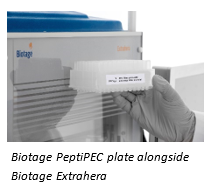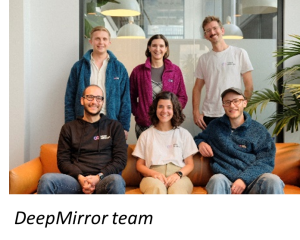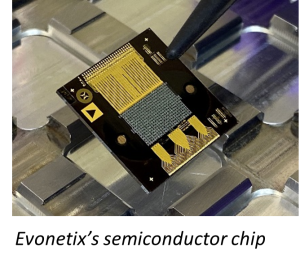
BioTechniques News
Lisa Faucher

Welcome to the 2024 Business of BioTechniques blog provided by Zyme Communications. This feature highlights the latest news and industry collaborations, from products and services to important upcoming events and key information in the biotech industry.
To keep up with industry news, don’t miss our monthly updates!
[ui-toggle title=”Navigate page” load=”hide”]
[/ui-toggle]
January update
This month’s Business of BioTechniques showcases industry news within the precision medicine, AI-powered drug discovery and synthetic biology sectors. Also highlighted are company collaborations producing new biopharmaceutical technologies, clinical trial programs progressing novel therapies and treatment approaches, as well as news of senior management and board appointments.
CRISPR
Key Charpentier/Doudna CRISPR patent upheld by Japanese Patent Office
ERS Genomics (Dublin, Ireland), which was formed to provide broad access to the foundational CRISPR/Cas9 intellectual property co-owned by Emmanuelle Charpentier, announced that its second Japanese Patent (JP6692856) was upheld for the second time in response to an invalidation challenge. The patent, filed by Charpentier together with The Regents of the University of California (CA, USA) and University of Vienna (Austria), was also upheld previously by the Japanese Patent Office 2021.
ERS Genomics provides licensing of CRISPR/Cas9 technology for companies interested in pursuing its use in their commercial programs. With 89 patents held in over 90 countries, ERS Genomics licenses these patents via its direct license from Emmanuelle Charpentier and now has nearly 150 licenses in place worldwide.
Drug discovery & development
CN Bio PhysioMimix Organ-on-a-Chip data supports Inipharm’s INI-822 for metabolic liver disease treatment: now in clinical testing
CN Bio (Cambridge, UK), a leading Organ-on-a-Chip company that designs and manufactures single-and multi-organ microphysiological systems, announced its PhysioMimix® assay for non-alcoholic steatohepatitis (NASH) was used to provide human-relevant data on compound efficacy for the submission of INI-822 from Inipharm, a biopharmaceutical company focused on discovering and developing therapies for severe liver diseases. The use of in vitro OOC for early evidence of efficacy for INI-822 demonstrates the transformative potential of these models to provide human-relevant data within preclinical programs.
Gyros Protein Technologies and Biotage partner to advance peptide purification efficiency with new automated solution
 Gyros Protein Technologies (Uppsala, Sweden), a leading provider of peptide synthesizers and reagents and a pioneer in automated nanoliter-scale immunoassays, and Biotage, a global life sciences company providing high-quality purification and sample preparation solutions, announced a partnership to offer Biotage® PeptiPEC, based on Gyros’ PurePep® EasyClean (PEC™) catch and release technology and on Biotage® Extrahera™ automated sample preparation system. The development of an automated plate-based peptide purification workflow provides a fast and environmentally sustainable solution for high-throughput peptide purification.
Gyros Protein Technologies (Uppsala, Sweden), a leading provider of peptide synthesizers and reagents and a pioneer in automated nanoliter-scale immunoassays, and Biotage, a global life sciences company providing high-quality purification and sample preparation solutions, announced a partnership to offer Biotage® PeptiPEC, based on Gyros’ PurePep® EasyClean (PEC™) catch and release technology and on Biotage® Extrahera™ automated sample preparation system. The development of an automated plate-based peptide purification workflow provides a fast and environmentally sustainable solution for high-throughput peptide purification.
Lario Therapeutics receives “Company Making a Difference Award” from CDLK5 Forum, recognizing its unique approach to precision medicine for genetic epilepsies
Lario Therapeutics (Edinburgh, UK), a biopharmaceutical company developing first-in-class precision medicines that are targeting disease-modifying treatments for severe neurological disorders, has received the “CDLK5 Forum Award for Excellence – Company Making a Difference 2023 Pre-clinical” from the Loulou Foundation at the annual CDLK5 Forum. The award is in recognition of its development of a validated, precision medicine approach for genetic epilepsies. Lario Tx’s first-in-class, orally active, CNS-penetrant CaV2.3 ion channel inhibitors hold promise as novel anti-seizure therapeutics for multiple epilepsy subtypes, including CDLK5 Deficiency Disorder.
Software and AI
DeepMirror launches early access program for its intuitive molecular drug design software
DeepMirror (Cambridge, UK), a University of Cambridge spin-out company developing intuitive design software for the discovery of novel therapeutic drugs, launched its Early Access Program after a successful closed beta program during which chemists were invited to test the software over several months. The software allows users to tap into AI-driven insights to improve and accelerate molecular design across the drug discovery pipeline through a secure and user-friendly interface which makes AI-powered drug discovery as simple as using a spreadsheet.
AI-enabled drug discovery programs often start with pharmaceutical companies partnering with AI companies to deliver insights for their drug discovery efforts. However, this approach requires extensive crosstalk between the two parties, resulting in long waiting times and large amounts of resources spent on both sides. DeepMirror aims to solve this issue by enabling R&D teams to carry out AI-driven research from day one, with seamless workflow integration and without the need to engage external stakeholders, develop internal teams or software, or relinquish any intellectual property. To join the waitlist for the Early Access Program sign up here.
Optibrium’s quantum mechanics and machine learning methods predict routes of drug metabolism
Optibrium (Cambridge, UK), a leading developer of software and AI solutions for drug discovery, announced the publication of its peer-reviewed study in Xenobiotica, ‘Predicting routes of phase I and II metabolism based on quantum mechanics and machine learning’. In the paper, the team demonstrate a new method that better determines the routes of metabolism and metabolites in early drug discovery.
Based on the combined model outputs, Optibrium showcase a new method to determine the most likely routes of metabolism and metabolites to be observed experimentally. The paper demonstrates that this method delivers high sensitivity in identifying experimentally reported metabolites, as well as higher precision than other methods for predicting in vivo metabolite profiles. It enables researchers to identify compounds with greater metabolic stability and better safety profiles, and underpins Optibrium’s recently launched StarDrop Metabolism module.
Synthetic biology
Evonetix announces agreement for revolutionary gene synthesis platform with Analog Devices
 Evonetix (Cambridge, UK), a company developing semiconductor scale technology to improve access to gene synthesis, has signed a joint development agreement and commercial supply agreement with Analog Devices, Inc. (ADI), a global semiconductor leader. This agreement signals the continuation of the long-standing combined work of both companies, bringing efforts to the next stage in producing a new technology benchmark that will help meet the global demand for better gene synthesis.
Evonetix (Cambridge, UK), a company developing semiconductor scale technology to improve access to gene synthesis, has signed a joint development agreement and commercial supply agreement with Analog Devices, Inc. (ADI), a global semiconductor leader. This agreement signals the continuation of the long-standing combined work of both companies, bringing efforts to the next stage in producing a new technology benchmark that will help meet the global demand for better gene synthesis.
Finance and funding
Metrion Biosciences closes £3.7m new equity financing
Metrion Biosciences (Cambridge, UK), a specialist ion channel CRO and drug discovery company, has secured £3.7m in new equity financing, including £2.5m from lead investor Maven Capital Partners (Maven) and £1m from existing investor, Gresham House Ventures (Gresham House). The funding will be used to further expand Metrion’s laboratories in Cambridge, invest in specialist equipment and enhance the company’s global marketing activities.
Metrion Biosciences also announced a series of board changes. David Milroy has joined the board as Maven’s investor director and Steve Carle has replaced Maya Ward as Gresham’s board representative. At the same time, Marc Rogers, Barry Kenny and Mark Keogh have retired as non-executive directors of the company.
Clinical trials
PlaqueTec recruits first ten patients in BIOPATTERN trial
PlaqueTec (Cambridge, UK), a company identifying endotype-specific biomarkers to advance precision medicine for coronary artery disease (CAD), has received the UK’s Medicines and Healthcare products Regulatory Agency approval to continue its BIOPATTERN trial following recruitment of the first ten patients with CAD. The trial has been designed to improve understanding of the pathobiology of atherosclerotic cardiovascular diseases and how it varies between individuals, to aid the development of novel therapies and treatment approaches.
The BIOPATTERN trial will use PlaqueTec’s proprietary blood sampling device, the Liquid Biopsy System™, to collect samples at multiple sites along a patient’s diseased coronary artery. Thousands of proteins and other blood molecules will be measured in each sample, enabling the assessment of trans-plaque gradients between samples. These data will be analyzed and used to generate a more detailed picture of the disease and enhance clinicians’ understanding of which proteins and biomolecules play key roles in CAD progression towards heart attack.
Exonate announces successful completion of Phase lb/lla trial in diabetic macular edema
Exonate (Cambridgeshire and Nottingham, UK), a biotechnology company developing novel, non-invasive, small-molecule therapeutics for patients with retinal vascular diseases, announced its lead ophthalmology asset, EXN407, has achieved its prespecified endpoints in a phase Ib/IIa study. During the trial, EXN407 met all safety and pharmacokinetic parameters and displayed encouraging signals of biological activity. Exonate has now regained full rights to its complete portfolio of ophthalmology assets from Janssen Pharmaceuticals, Inc. (Janssen), a Johnson & Johnson company. EXN407 is well placed to be the first topical treatment for retinal vascular diseases, including diabetic retinopathy and diabetic macular edema.
Catherine Beech, CEO of Exonate, commented: “The results from the EXN407 trial are very encouraging, with the data validating the hypothesis that modulating VEGF splicing can lead to clinical benefits. We are excited to progress to the phase II trial next year and welcome enquiries by potential partners for the program.”
SolasCure demonstrates proof-of-concept in Phase lla safety trial of Aurase Wound Gel
SolasCure (Cambridge, UK), a biotechnology company developing a hydrogel containing tarumase (provisional INN) – a recombinant enzyme derived from maggots, which aims to accelerate wound debridement and contribute to wound bed preparation & healing – announced the results of its proof-of-concept, first-in-human, Phase IIa safety study. The CLEANVLU trial evaluated the company’s first investigational product, Aurase Wound Gel, for use in chronic venous leg ulcer patients over 12 applications of the product (dosed every 3 days).
People
Sphere Fluidics appoints Dr. Graeme Daniels as Vice President of Sales and Marketing
Broken String Biosciences appoints Gavin Burns as Vice President of Quality and Operations
CN Bio appoints Neil Rumbelow as Director of Product Development
NanoSyrinx appoints Anthony Johnson as Non-Executive Director
Camena Bioscience appoints Dr Nicola Thompson as Chair of the Board
Author details
Zyme Communications provides PR and marketing services for the life science sector to help companies raise their profile and generate interest from commercial leads, investors and partners. With an international network of life science trade media contacts and a strong technical understanding, Zyme is committed to providing real value from objective-led communications. To find out more, visit the website, or follow Zyme Communications on LinkedIn and Twitter.
The post Business of <em>BioTechniques</em> 2024 appeared first on BioTechniques.
Powered by WPeMatico
